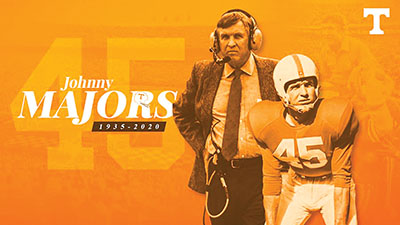Already missed, Johnny has one ‘Heck’ of a story

In the 1980s while coaching at Rule High, I would attend coach Majors’ coaching clinics at the University of Tennessee. He was always working the crowd and talking with high school coaches.
I was fortunate to be with Don Ward, and John would always spend five or 10 minutes talking with Don about Knoxville high school football, and I would get to be a fly on the wall. Coach Majors and Don would always exchange coaching gems that would open my eyes to the little things that so many coaches overlook.
In the early 2000s while on the staff at Knoxville Central High, I attended a Coach of the Year Clinic in Atlanta. Coach Majors owned the Coach of the Year Clinic. He had purchased the business from legendary Michigan State head coach Duffy Daugherty and held clinics in different cities across the nation.
The Clinic was well-organized and featured major college coaches as speakers. Again, like the UT clinic, coach Majors was very active and visible while having informal talks with coaches outside the formal sessions.
I was now an old man on the staff and was acting as a mentor for a couple of younger coaches. It was Saturday night and I directed my young friends to the free sandwiches and beer provided by the clinic. We ended up sitting in the lobby watching all the coaches coming back from their nights out on the town and laughing at their returns.
Coach Majors came in from his dinner and recognized the Central coaches and came to talk with us. He remembered my face and spoke of the ’80s and entertained us with stories of his days as a young coach.
Coach Majors understood that to be effective as a coach you had to reach the player on two levels. The first level was the personal level, where you as a coach demonstrated that you care for the player as an individual, that he is more than an object — that he is a person that matters beyond his role on your team. His life is what is important and his success in his life is the ultimate goal of the relationship between the coach and player.
Coach did that with my young friends by spending those few minutes in the lobby.
The second level is that of a leader. As a leader the coach has to make hard decisions and enforce harsh penalties. On Sunday morning at his Coach of the Year Clinic, coach Majors would demonstrate that leadership quality to my young companions.
Our boss, Joel Helton, had made it very plain that we were to attend a session on Sunday morning. The whole staff was there, on time, prepared to take notes and bring the information back to Bobcat land. It did not take long for us to realize the speaker was not discussing his advertised topic. Coach Helton was not the most patient man, and he soon closed his notebook and walked out of the room.
My eyes followed Joel out of the room and saw him meet coach Majors. I knew their conversation was about why Joel was leaving. Coach Majors entered the room and went straight to the speaker and pulled him to a side bar. There was an obvious brief lecture by Johnny, and the speaker returned to the podium.
He immediately apologized for his presentation and explained there had been a miscommunication.
My young friends in the span of less than 12 hours had witnessed coach Majors’ model what coaching is. He had shown the caring of communication and the hardness of leadership.
I know L. A. Headrick at Fulton and Kevin Lane at Knoxville Catholic are now modeling the characteristics they witnessed in Atlanta at coach Majors’ Clinic.
Coach Majors still influences the young people of Tennessee.


